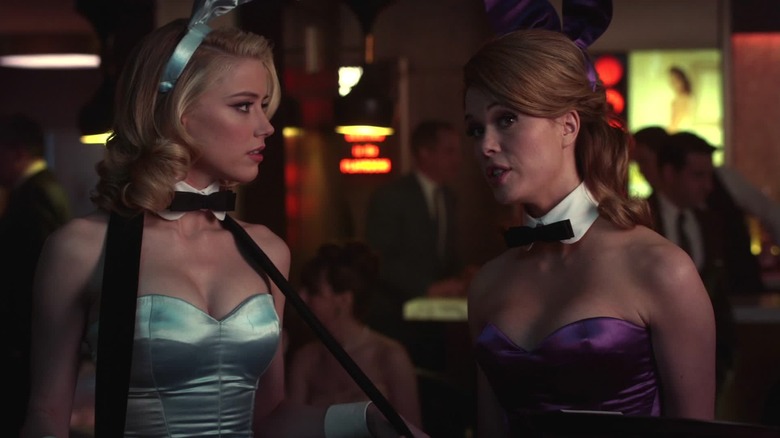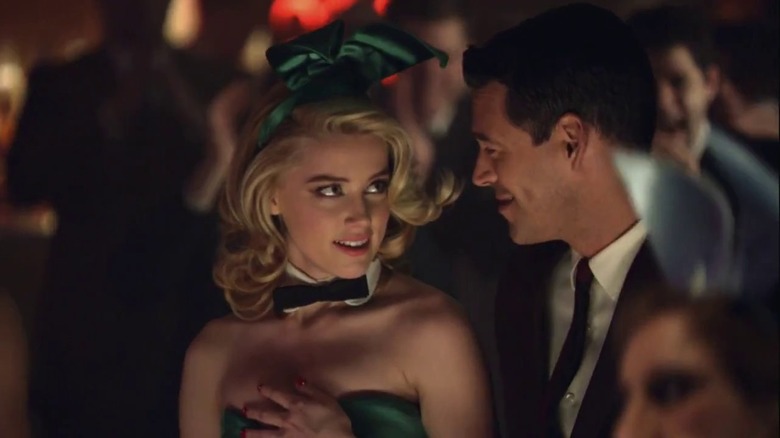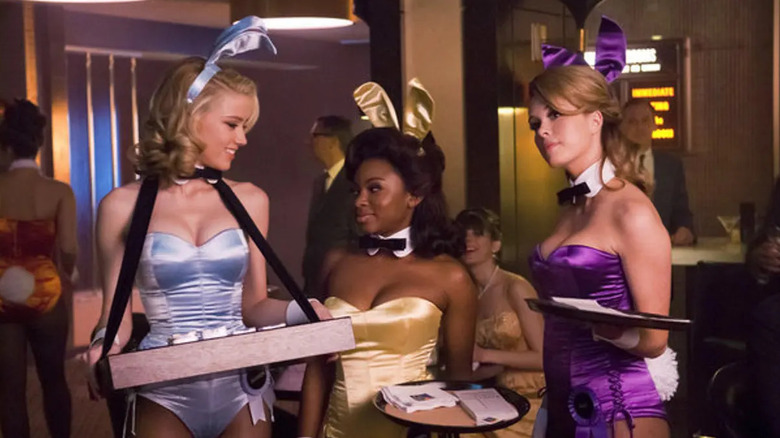Why The Playboy Club Was Canceled After Just Three Episodes
The #MeToo movement and the release of the documentary series "The Secrets of Playboy" pretty much killed the Playboy brand (and rightfully so). For decades, Hugh Hefner dressed up sexual freedom as female empowerment. He supported progressive ideals of racial equality, queer identity, and a woman's right to choose. But his image as a cultural liberator and the suave womanizer every man should envy was just a veneer. Hugh Hefner was a controlling hoarder, and inside his so-called famous luxury mansion, which was dull and musty inside, he allegedly drugged and manipulated women into performing degrading sex acts. He would secretly film some women and use the footage as blackmail (via Variety).
From 2005 to 2010, the reality series "The Girls Next Door" on E! made the Playboy brand more popular than it had ever been. It painted Hef's three live-in girlfriends Holly, Bridget, and Kendra as cartoony, frilly playthings and Hef himself as a harmless, cutesy old man. The next year, in 2011, showrunner Chad Hodge wanted to capitalize on the renewed interest in the swinging 1960s from AMC's "Mad Men."
"Mad Men" peers under the glamorous surface of this transformative decade, revealing the emptiness of consumer culture and a yearning for authenticity, in the vein of a great American novel like "The Great Gatsby." "The Playboy Club," and a similar series on ABC "Pan Am," are far more frothy and mainly enjoy the era's bombshell aesthetics. While "The Playboy Club" managed to draw in 5 million viewers for its premiere episode, its audience quickly dropped to 3.2 million (via TV By the Numbers). This descent was just one of reasons "The Playboy Club" was canceled so prematurely after only three episodes.
Conservative groups rallied for a boycott
It was always going to be difficult for "The Playboy Club" to succeed because the series was steeped in controversy before even airing. The anti-pornography organization Morality in Media started an online petition urging NBC to cancel the show, as well as The Pink Cross Foundation and the San Francisco Commission on the Status of Women. Gloria Steinem, who had famously gone undercover as a Playboy Bunny for an exposé in SHOW magazine, also encouraged a boycott of the series.
The Parents Television Council led this moral panic, sending letters to NBC affiliates, threatening to file complaints with the Federal Communications Commission, and calling for a reinstatement of the Broadcast Decency Enforcement Act of 2005 to increase the fines and penalties for broadcasting obscene materials (via The Parents Television Council). The PTC claimed in The Hollywood Reporter that with "The Playboy Club," "NBC has breached the public trust by airing what amounts to a weekly advertisement for a pornographic brand."
All the Parent Television Council's fretting is ridiculous because, as a mainstream network show, there was never going to be any nudity. Any sex scene or allusions to the Playboy magazine would have to be rather tame. All this hubbub was successful because seven advertisers — Kraft, Sprint, Lenovo, UPS Store, Subway, P.F. Chang's China Bistro, and Campbell's Soup — ended up pulling out by the second episode (via The Hollywood Reporter), and after the third episode's airing, the show was axed. While a few more episodes were filmed in the hopes of finding a new network, they remain unaired and lost to time.
The Bunnies aren't always in the spotlight
Another big issue the series had was that it attempted to frame itself as a story of feminist progress — but is wearing a cottontail and serving drinks to horny men really that? Actors Amber Heard and Leah Renee defended the series at the 2011 Television Critics Association panel, claiming, "It's about the time. It comes down to choices. If they are making the choice, they are not being exploited," which is a very simplistic way of looking at the patriarchal systems that set up these leisure institutions for men, something the series does not interrogate (via After Elton).
Creator Chad Hodge refuted the idea that he was trying to make something "politically ambitious or make a statement or make this a show about empowering women, which sounds super boring to me. That sounds like a documentary, which this certainly is not. This is more like 'Chicago,' 'Moulin Rouge,' and 'All That Jazz,' 'Desperate Housewives.' This is a fun, sexy soap" (via The Hollywood Reporter). As much as "The Playboy Club" wants to be a flashy pastiche of the best movie musicals, there's not much fun to be found. It focuses too much on a boring and dour mafia subplot, as if trying to draw in a male audience who was missing "The Sopranos." This distraction takes away from what would be enticing narratives on their own, such as the competitive dynamics of working as a Bunny or balancing this unique profession with the cultural transformations and long-held expectations of being a housewife at the time.
A show like "Mad Men" examines the 1960s and women's sexuality with deftness, while "The Playboy Club" is tone-deaf. But if you still want to give it a shot, it's available to stream on Roku.


